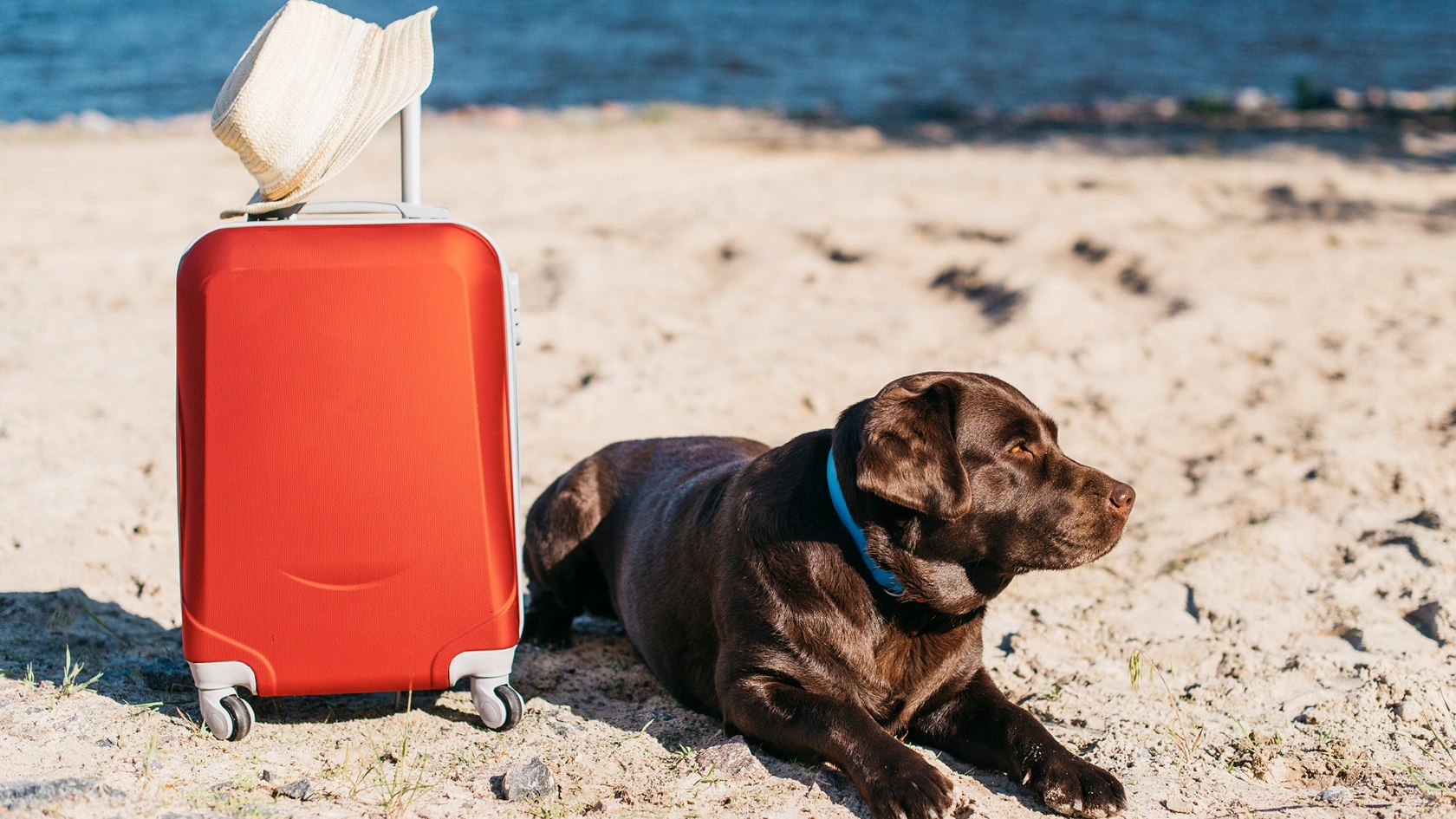TL; DR — International Health Certificate for Pets
- The International Health Certificate proves that dogs, cats, and even exotic pets are healthy and ready to travel.
- Licensed veterinarians complete the certificate, and some countries may require it to be officially endorsed.
- It confirms vaccinations, treatments, and overall health so pets can travel safely.
- Some destinations have special rules, especially for exotic pets or endangered species.
- Having the right documents helps pets enter smoothly and avoid quarantine or border delays.
- Checking requirements with the CFIA or your destination country’s embassy ensures everything is in order.
- Planning ahead and getting your pet properly certified makes international travel safer and less stressful.
Need help getting your pet ready for travel? Contact us—our team is here to guide you every step of the way.
Are you planning to travel internationally with your pet? Crossing borders with pets isn’t just about packing their favourite things—it also means making sure their health is in check. A Canadian International Health Certificate, filled out by a veterinarian, may be required to meet the import rules of your destination country.
This certificate, guided by the Canadian Food Inspection Agency (CFIA), may need to be endorsed by an official government veterinarian. It shows that your dog or cat is healthy to travel and free from diseases like rabies, with all required vaccinations up to date. Some countries even have special rules for exotic pets, such as ferrets or endangered species of wild fauna.
As a pet owner, it’s important to understand international borders, import rules, and travel information before taking your animal abroad. Certification and inspections help ensure your pet is fit for travel and avoids complications at customs. Read on to find out how to get your dog or cat ready for international pet travel safely and smoothly.
Understanding the International Health Certificate for Pets

Traveling with your pets—whether within the country or abroad—takes some planning. One key step is making sure you have an International Health Certificate, which proves your pet is healthy and ready to travel. This document confirms that your pet is fit to travel, free from contagious diseases like rabies, and meets the import and export requirements of your destination country. It also helps make pet entry at international borders smoother and gives pet owners peace of mind before they leave Canada.
What Is an International Health Certificate?
An International Health Certificate, also called a certificate of veterinary inspection or pet health certificate, is completed by a licensed or accredited veterinarian and may be printed on legal paper. Key points include:
- The certificate may need endorsement by an official government veterinarian.
- It states that your pet is healthy to travel and isn’t carrying contagious diseases.
- It ensures compliance with special regulations, such as the Convention on International Trade in Endangered Species of Wild Fauna and Flora (CITES).
What Information Does It Include?
A complete certificate typically provides details about your pet’s health and treatments:
- Proof of required vaccinations, including rabies.
- Treatments for tapeworms or other common health concerns.
- Notes for exotic pets or animals that need negotiated, specific veterinary health certificates.
- Confirmation from an animal hospital or veterinary clinic that your pet is healthy and free from disease.
Why It Matters for Pet Travel
Having an International Health Certificate for your pet helps you travel with confidence:
- Many countries require the certificate to be issued by an accredited veterinarian and endorsed by an official before pet entry.
- It’s recognized by embassies, the CFIA, and importing country veterinary authorities.
- Ensures that your dog, cat, or exotic pet is fit for travel and avoids delays if your pet is healthy to travel and isn’t compliant with regulations.
- Helps you meet current import requirements days before travel, making domestic and international travel less stressful.
Before travelling, pet owners should contact the CFIA, the embassy of their destination country, or the appropriate veterinary authorities to confirm all requirements. Knowing how to get your pet officially certified is the first step to taking your pet safely to another country.
Travel Documents Required for International Pet Travel

If you’re taking your pet on an international trip, it’s important to get the right travel documents and certificates ahead of time. These show that your pet is healthy, safe to travel, and meets the entry rules of your destination—saving you from delays, quarantine, or the risk of being turned away.
1. Export Documents & Certificates from Canada
Export certificates are the first step for international travel and can be obtained through inspection.canada.ca.
- Completed by a veterinarian, confirming your pet is healthy and free from diseases.
- Shows your pet is fit for domestic and international travel.
- Often required for all pets leaving Canada to meet the rules of the importing country.
2. Negotiated or Provided Health Certificates
Some countries have special requirements, so it’s important to know what your destination asks for:
- Either negotiated specific veterinary health certificates or had pets that provided their own health certificate.
- These certificates are issued by a licensed veterinarian and must meet the standards of the importing country.
- Ensures that your pet can travel without any trouble and comply with regulations.
Ensuring Animal Health and Certification with a Canadian International Health Certificate

Making sure your dog, cat, or exotic pet is healthy and properly certified is a critical part of international pet travel. A Canadian International Health Certificate confirms your pet is healthy and fit to travel and meets the import requirements. This certificate contains official documentation recognized by the CFIA, embassies, and the importing country’s veterinarian.
1. Role of the Veterinarian
The certificate must be completed by a licensed or accredited veterinarian, who examines your pet to guarantee it is fit to travel and free from any diseases. The veterinarian records required vaccinations and any treatments, including tapeworm prevention if applicable. For exotic pets, the veterinarian may also issue negotiated specific veterinary health certificates as required by certain countries.
2. Certificate Requirements
A proper Canadian International Health Certificate is often printed on legal paper and may need endorsement by an official government veterinarian. Certain countries require the certificate to follow very specific formats or additional procedures. It helps the pet owner demonstrate that the pet is healthy to travel and ready for domestic and international travel.
3. Verification and Compliance
Before travel, pet owners should contact the appropriate veterinary authorities or the embassy of their destination country to confirm current import rules. Ensuring the certificate clearly states that the pet may travel safeguards pet health and allows smooth pet entry at international borders. Proper preparation with a Canadian International Health Certificate gives confidence that your dog, cat, or exotic pet is ready for travel.
Preparing Dogs, Cats, and Exotic Pets for International Travel

Travelling with your pets takes good planning to make sure they are healthy and ready for the trip. Getting everything in order helps your pets enter another country smoothly and keeps them safe and comfortable during travel.
1. Veterinary Checkups and Pet Health
Before your journey, take your pets to a licensed or accredited veterinarian.
- Go over required vaccinations, like rabies, and any treatments such as tapeworm prevention.
- Your pets must be healthy and free from any health conditions that could affect your travel.
- For exotic pets or special cases, your veterinarian can arrange a negotiated, specific veterinary health certificate.
2. Preparing Required Travel Documents
Gathering all the needed paperwork is important.
- Obtain a Canadian International Health Certificate or a pet health certificate completed by your veterinarian.
- Some certificates may need endorsement by an official government veterinarian.
- Check with the embassy of your destination country or contact the appropriate veterinary authorities to make sure you meet requirements for certain countries.
3. Ensuring Smooth Pet Entry
Planning ahead helps you avoid delays and problems at borders.
- All certificates must clearly and completely indicate that your pet can legally travel.
- Your pet's certificates must meet the country's import regulations for animals.
- Being always prepared with health checks and required paperwork makes the journey smooth and stress-free.
Final Thoughts
Travelling internationally with pets requires careful planning to keep them healthy and safe. A Canadian International Health Certificate shows that dogs, cats, or exotic pets are fit to travel. It must be completed by a licensed veterinarian and may need endorsement by an official authority.
Vaccinations, treatments, and proper documentation help meet import requirements and avoid delays. Contacting the CFIA or the embassy of the destination country ensures compliance with current rules. For guidance on preparing your pet for international travel, contact us—our team is here to help every step of the way.
Frequently Asked Questions
What is a Canadian International Health Certificate, and why is it required for pets?
A Canadian International Health Certificate is an official document that confirms a pet is healthy and ready for travel.
Purpose of the certificate: It proves that your dogs, cats, or exotic pets are free from any contagious diseases and have the necessary vaccinations.
Official recognition: The certificate is accepted by the CFIA, embassies, and the veterinary authorities in the country of destination.
Compliance with regulations: Many countries require this certificate for entry to avoid quarantine or refusal at the border.
Health assurance: It reassures both authorities and pet owners that the animal is healthy and safe to travel.
How are travel documents obtained for a dog, cat, or exotic pet travelling abroad?
Getting the right travel documents and paperwork is a key step to ensure pets can enter another country smoothly.
Veterinary completion: Documents like the pet health certificate or export certificate must be completed by a licensed or accredited veterinarian.
Endorsement requirements: Some countries may ask for additional endorsement by an official government veterinarian.
Issuing the certificate: The veterinarian or government authority can officially issue a certificate that confirms the pet is healthy to travel.
Destination-specific rules: The embassy of the country of travel or the appropriate veterinary authorities can confirm the exact requirements.
When should a veterinarian be consulted to ensure a pet is healthy to travel?
A veterinarian should check pets in advance to make sure they are fit for international travel.
Timing of visits: Pets should be examined several days before travel so certificates can be completed on time.
Vaccination review: Required vaccinations, like rabies, and treatments such as tapeworm prevention should be confirmed.
Special cases: Exotic pets or pets needing negotiated specific veterinary health certificates may require earlier visits.
Preventive measures: Routine checkups help ensure pets are healthy and ready for both domestic and international travel.
What steps are needed to get your pet ready for international travel?
Planning an international travel with pets involves detailed planning.
Health assessment: A licensed or accredited veterinarian should confirm the pet is healthy and free from diseases.
Document preparation: Obtain a Canadian International Health Certificate or pet health certificate and have it endorsed if needed.
Travel compliance: Check with the embassy or appropriate veterinary authorities to meet import requirements, including for exotic pets or special cases.
Smooth entry: Completing these steps guarantees your pet can travel without any problem and meet the animal import/export regulations of the destination country.
How can pets meet the import requirements of another country?
Meeting import requirements is key to avoiding quarantine or denied entry.
Required documentation: Pets need a valid Canadian International Health Certificate or a pet health certificate completed by a licensed veterinarian.
Vaccinations and treatments: Proof of vaccinations, like rabies, and treatments such as tapeworm prevention, is often mandatory.
Authority verification: Contact the embassy or appropriate veterinary authorities to confirm country-specific rules.
Compliance check: Ensuring all documents and health requirements are in order allows pets to travel internationally safely and smoothly.




